09.非谓语动词精讲巧练
非谓语动词语法讲解及练习

运动?
介词的宾语。
—He likes to play basketball.他喜欢打篮球。
My mother made me play the piano all the time. 宾补 我妈妈让我一直弹钢琴。
在make,let,see,hear,watch等 使役、感官动词后,不定式省略 to。
Relaxing allows you _______to your studies with more energy.
A: return
B: to return C: returning
( )7. Nick, would you mind ________those old jeans? They look terrible.
tell, ask, want, allow, get, would like, encourage后常跟动词不定式作宾语补足语。如:
My mother encourages me to learn Japanese. 我妈妈鼓励我学日语。
注意:还有一些使役动词和感官动词也用不定式作宾补,这时不定式要省略to。这些动词有:
A: Being;being B: To be;being C: Being;to be
D: To be;to be
( )9.—Don't forget ______your history and politics books tomorrow morning.
—Thanks. I won't.
A: b to clean the room everyday.=To clean 多数情况下,不定式作表语,可转 the room every day is my work. 我的工作就是每 换作为主语。 天打扫这间屋子。
非谓语动词精讲精练
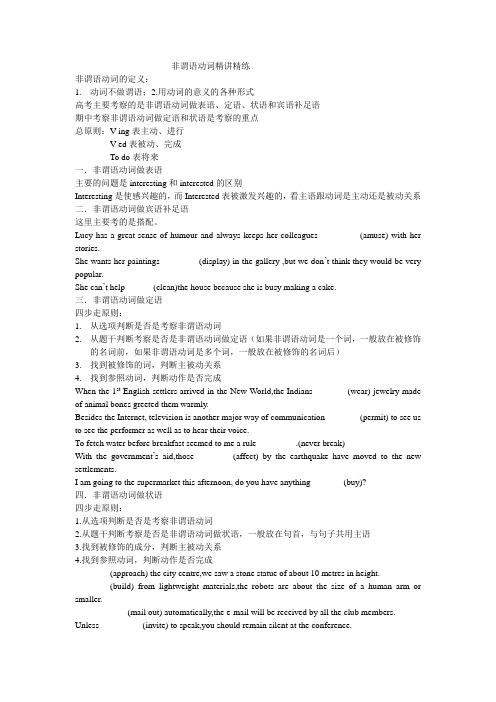
非谓语动词精讲精练非谓语动词的定义:1.动词不做谓语;2.用动词的意义的各种形式高考主要考察的是非谓语动词做表语、定语、状语和宾语补足语期中考察非谓语动词做定语和状语是考察的重点总原则:V-ing表主动、进行V-ed表被动、完成To do表将来一.非谓语动词做表语主要的问题是interesting和interested的区别Interesting是使感兴趣的,而Interested表被激发兴趣的,看主语跟动词是主动还是被动关系二.非谓语动词做宾语补足语这里主要考的是搭配。
Lucy has a great sense of humour and always keeps her colleagues _________(amuse) with her stories.She wants her paintings_________(display) in the gallery ,but we don’t think they would be very popular.She can’t help ______(clean)the house because she is busy making a cake.三.非谓语动词做定语四步走原则:1.从选项判断是否是考察非谓语动词2.从题干判断考察是否是非谓语动词做定语(如果非谓语动词是一个词,一般放在被修饰的名词前,如果非谓语动词是多个词,一般放在被修饰的名词后)3.找到被修饰的词,判断主被动关系4.找到参照动词,判断动作是否完成When the 1st English settlers arrived in the New World,the Indians________(wear) jewelry made of animal bones greeted them warmly.Besides the Internet, television is another major way of communication________(permit) to see us to see the performer as well as to hear their voice.To fetch water before breakfast seemed to me a rule_________.(never break)With the government’s aid,those ________(affect) by the earthquake have moved to the new settlements.I am going to the supermarket this afternoon, do you have anything _______(buy)?四.非谓语动词做状语四步走原则:1.从选项判断是否是考察非谓语动词2.从题干判断考察是否是非谓语动词做状语,一般放在句首,与句子共用主语3.找到被修饰的成分,判断主被动关系4.找到参照动词,判断动作是否完成________(approach) the city centre,we saw a stone statue of about 10 metres in height.________(build) from lightweight materials,the robots are about the size of a human arm or smaller.____________(mail out) automatically,the e-mail will be received by all the club members. Unless__________(invite) to speak,you should remain silent at the conference.Having been attacked by terrorists,_________________.A.doctors came to their rescueB.the tall building collapsedC.an emergency measure was takenD.warning were given to tourists.In order to make our city green,______________.A.it is necessary to have planted more treesB.many more trees need to plantC.our city needs more treesD.we must plant more trees。
非谓语动词精讲精练
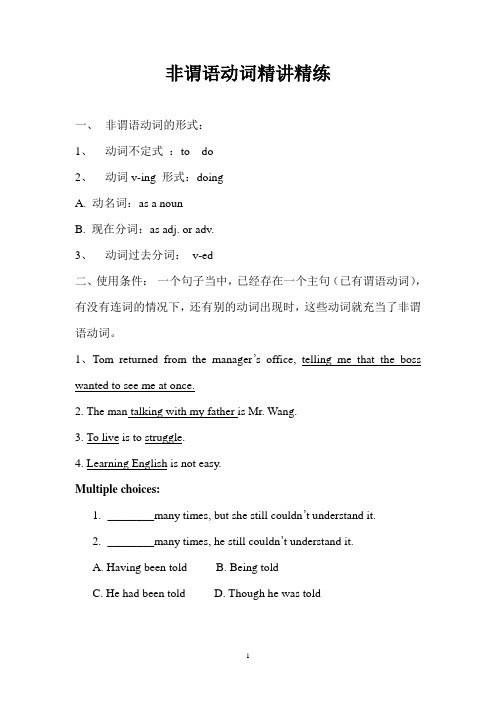
非谓语动词精讲精练一、非谓语动词的形式:1、动词不定式:to do2、动词v-ing 形式:doingA. 动名词:as a nounB. 现在分词:as adj. or adv.3、动词过去分词:v-ed二、使用条件:一个句子当中,已经存在一个主句(已有谓语动词),有没有连词的情况下,还有别的动词出现时,这些动词就充当了非谓语动词。
1、Tom returned from the manager’s office, telling me that the boss wanted to see me at once.2. The man talking with my father is Mr. Wang.3. To live is to struggle.4. Learning English is not easy.Multiple choices:1.________many times, but she still couldn’t understand it.2.________many times, he still couldn’t understand it.A. Having been toldB. Being toldC. He had been toldD. Though he was told3.It ______ a hot day, we’d better go swimming.4._______a rainy day; we decided not to go there.A. isB. to beC. beingD. It beingE. It wasF. been三、非谓语动词的句法作用。
Exercises:区分以下的非谓语动词形式;1.Running is good for our health.2.I saw him drawing in the classroom.3.I went to see my grandfather last night.4.She can’t help laughing.四、非谓语动词的解题技巧:下面从两个方面来复习非谓语动词:(一)、七大原则原则一:用作目的状语,一般用动词不定式:to do原则二:用作伴随状语,一般用现在分词:doing原则三:原作结果状语,可用to do \doing原则四:凡是含有被动意义时,原则上用过去分词原则五:非谓语动词作状语时,其逻辑主语应与主句主语相一致。
非谓语动词习题答题技巧
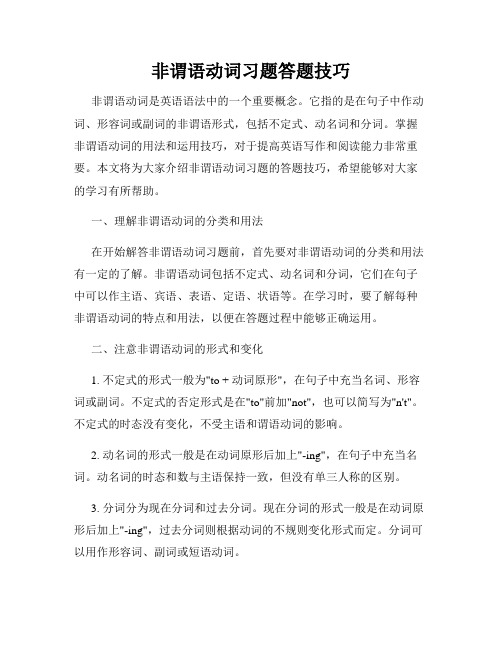
非谓语动词习题答题技巧非谓语动词是英语语法中的一个重要概念。
它指的是在句子中作动词、形容词或副词的非谓语形式,包括不定式、动名词和分词。
掌握非谓语动词的用法和运用技巧,对于提高英语写作和阅读能力非常重要。
本文将为大家介绍非谓语动词习题的答题技巧,希望能够对大家的学习有所帮助。
一、理解非谓语动词的分类和用法在开始解答非谓语动词习题前,首先要对非谓语动词的分类和用法有一定的了解。
非谓语动词包括不定式、动名词和分词,它们在句子中可以作主语、宾语、表语、定语、状语等。
在学习时,要了解每种非谓语动词的特点和用法,以便在答题过程中能够正确运用。
二、注意非谓语动词的形式和变化1. 不定式的形式一般为"to + 动词原形",在句子中充当名词、形容词或副词。
不定式的否定形式是在"to"前加"not",也可以简写为"n't"。
不定式的时态没有变化,不受主语和谓语动词的影响。
2. 动名词的形式一般是在动词原形后加上"-ing",在句子中充当名词。
动名词的时态和数与主语保持一致,但没有单三人称的区别。
3. 分词分为现在分词和过去分词。
现在分词的形式一般是在动词原形后加上"-ing",过去分词则根据动词的不规则变化形式而定。
分词可以用作形容词、副词或短语动词。
三、掌握非谓语动词的常见搭配和用法在答题过程中,要注意掌握非谓语动词的常见搭配和用法。
下面列举一些常见的搭配和用法:1. 不定式常与短语动词搭配,如"agree to"、"decide to"、"plan to"等。
2. 动名词常与介词搭配,如"be interested in"、"look forward to"、"depend on"等。
非谓语动词例题讲解及练习
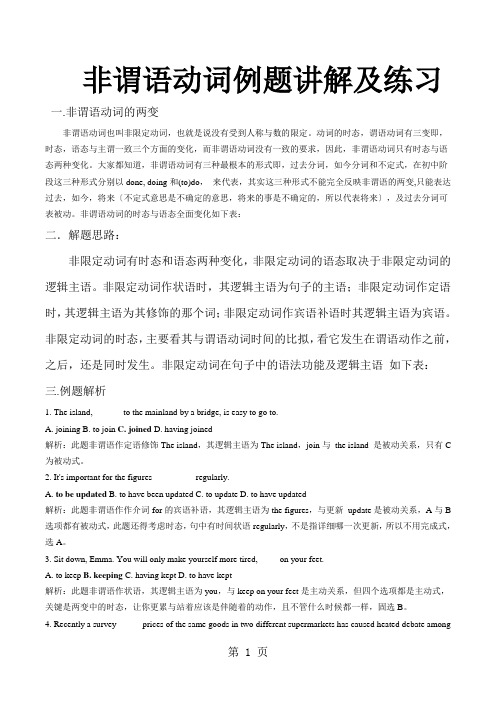
非谓语动词例题讲解及练习一.非谓语动词的两变非谓语动词也叫非限定动词,也就是说没有受到人称与数的限定。
动词的时态,谓语动词有三变即,时态,语态与主谓一致三个方面的变化,而非谓语动词没有一致的要求,因此,非谓语动词只有时态与语态两种变化。
大家都知道,非谓语动词有三种最根本的形式即,过去分词,如今分词和不定式,在初中阶段这三种形式分别以done, doing和(to)do,来代表,其实这三种形式不能完全反映非谓语的两变,只能表达过去,如今,将来〔不定式意思是不确定的意思,将来的事是不确定的,所以代表将来〕,及过去分词可表被动。
非谓语动词的时态与语态全面变化如下表:二.解题思路:非限定动词有时态和语态两种变化,非限定动词的语态取决于非限定动词的逻辑主语。
非限定动词作状语时,其逻辑主语为句子的主语;非限定动词作定语时,其逻辑主语为其修饰的那个词;非限定动词作宾语补语时其逻辑主语为宾语。
非限定动词的时态,主要看其与谓语动词时间的比拟,看它发生在谓语动作之前,之后,还是同时发生。
非限定动词在句子中的语法功能及逻辑主语如下表:三.例题解析1. The island, ______ to the mainland by a bridge, is easy to go to.A. joiningB. to joinC. joinedD. having joined解析:此题非谓语作定语修饰The island,其逻辑主语为The island,join与the island 是被动关系,只有C 为被动式。
2. It's important for the figures _________ regularly.A. to be updatedB. to have been updatedC. to updateD. to have updated解析:此题非谓语作作介词for的宾语补语,其逻辑主语为the figures,与更新update是被动关系,A与B 选项都有被动式,此题还得考虑时态,句中有时间状语regularly,不是指详细哪一次更新,所以不用完成式,选A。
高考英语非谓语动词解题技巧讲解及练习题(含答案)

高考英语非谓语动词解题技巧讲解及练习题(含答案)一、单项选择非谓语动词1.The sign on the wall of the library says, “No magazine is allowed out of the reading room”. A.being taken B.to takeC.to be taken D.taking【答案】C【解析】【详解】考查非谓语动词。
句意:图书馆墙上的牌子上写着:“杂志不允许带出阅览室。
”be allowed to do“被允许做”。
根据句意可知,此处应使用被动式。
故C选项正确。
2.Children who are over-protected by their parents may become _____.A.hurt B.spoiled C.damaged D.harmed【答案】B【解析】试题分析:考查动词辨析:句意:过分受父母保护的孩子可能会被惯坏。
spoil作为动词有“宠坏,溺爱”的意思,这里用动词的过去分词作形容词。
hurt指对身体或感情上的伤害;damaged指被毁坏或破坏(好像多指物);harmed指被损害,被伤害,被危害。
选B。
考点:考查动词辨析3._______ the classroom for a whole afternoon, the monitor decided to have a rest. A.Having cleaned B.To cleanC.Cleaned D.Clean【答案】A【解析】考查非谓语动词。
句意:整个下午打扫了教室之后,班长决定休息一下。
句中clean的动作比decided早,故用完成时;the monitor和clean是主动关系,此处作状语用动词-ing形式,故此处用动词-ing形式的完成时,故选A。
4.(北京)The national park has a large collection of wildlife, _________ from butterflies to elephants.A.ranging B.rangeC.to range D.ranged【答案】A【解析】试题分析:句意:国家公园有许多的野生动物,包括从蝴蝶到大象等等。
高中语法非谓语动词精讲精练
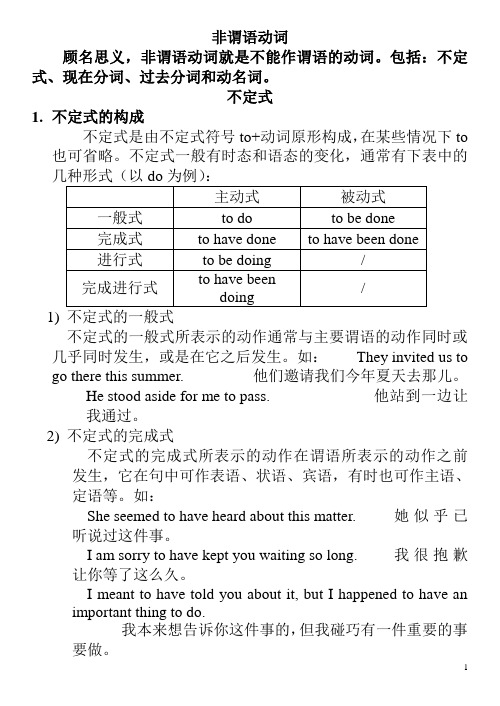
非谓语动词顾名思义,非谓语动词就是不能作谓语的动词。
包括:不定式、现在分词、过去分词和动名词。
不定式1.不定式的构成不定式是由不定式符号to+动词原形构成,在某些情况下to 也可省略。
不定式一般有时态和语态的变化,通常有下表中的几种形式(以do为例):1)不定式的一般式不定式的一般式所表示的动作通常与主要谓语的动作同时或几乎同时发生,或是在它之后发生。
如:They invited us to go there this summer. 他们邀请我们今年夏天去那儿。
He stood aside for me to pass. 他站到一边让我通过。
2)不定式的完成式不定式的完成式所表示的动作在谓语所表示的动作之前发生,它在句中可作表语、状语、宾语,有时也可作主语、定语等。
如:She seemed to have heard about this matter. 她似乎已听说过这件事。
I am sorry to have kept you waiting so long. 我很抱歉让你等了这么久。
I meant to have told you about it, but I happened to have animportant thing to do.我本来想告诉你这件事的,但我碰巧有一件重要的事要做。
It has been an honor for me to have traveled so much in your country.对我来说,在你们国家旅行这么多地方是一件很荣幸的事情。
3)不定式的进行式不定式的进行式表示正在进行的与谓语动词同时发生的动作。
它在句中可以用作除谓语以外的所有成分。
如:It’s nice of you to be helping us these days.你真好,这些天一直帮我们。
He pretended to be listening to the teacher carefully. 他假装在认真地听老师讲课。
《非谓语动词精练》课件

现在分词是动词的一种形式,表 示正在进行的动作或存在的状态
。
用法
现在分词可以作为谓语动词的一部 分,也可以作为定语、表语、状语 等。
例子
例如,“The movie is interesting”中的“interesting” 就是现在分词,作为表语使用。
过去分词
定义
过去分词是动词的一种形式,表示已 经完成的动作或存在的状态。
as复合结构
as复合结构通常用于表示时间、让步或方式等意义。
as复合结构通常由“as+从句”构成,其中从句中的主语是非谓语动词。例如, “As a result of the accident, the car was totaled.”这句话表示“由于事故, 汽车被报废了”。
独立主格结构与其他结构的转换
例子
例如,“I want to go to
the
park”中的“to
go”就是不定式,作为谓
语使用。
独立主格结构
定义
独立主格结构是一种特殊的语法 结构,由名词或代词加上分词或 不定式构成,表达独立于主句的
主谓关系。
用法
独立主格结构可以表示时间、条 件、原因等,常用于书面语中。
例子
例如,“The book written by him is very popular”中的
2023 WORK SUMMARY
《非谓语动词精练》 PPT课件
REPORTING
目录
• 非谓语动词概述 • 非谓语动词的用法 • 非谓语动词的时态和语态 • 非谓语动词的特殊用法 • 非谓语动词的练习与解析 • 非谓语动词的易错点与难点解析
PART 01
非谓语动词概述
定义与分类
高中英语非谓语动词用法详解和练习含详解
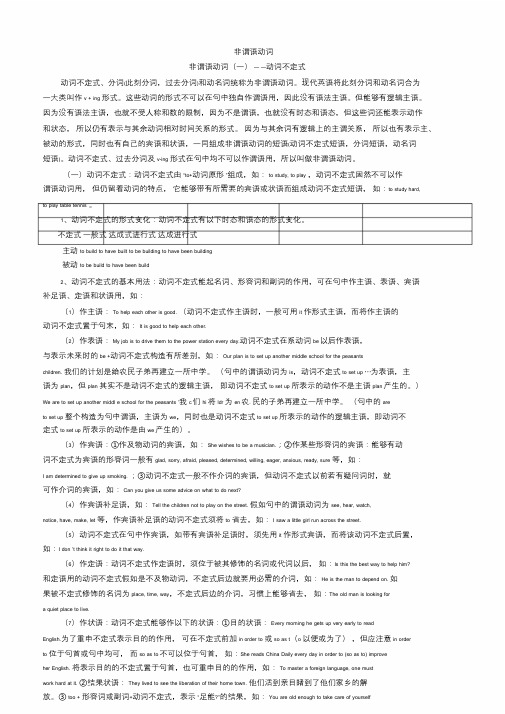
非谓语动词非谓语动词(一)——动词不定式动词不定式、分词(此刻分词,过去分词)和动名词统称为非谓语动词。
现代英语将此刻分词和动名词合为一大类叫作 v + ing 形式。
这些动词的形式不可以在句中独自作谓语用,因此没有语法主语。
但能够有逻辑主语。
因为没有语法主语,也就不受人称和数的限制,因为不是谓语,也就没有时态和语态,但这些词还能表示动作和状态,所以仍有表示与其余动词相对时间关系的形式。
因为与其余词有逻辑上的主谓关系,所以也有表示主、被动的形式,同时也有自己的宾语和状语,一同组成非谓语动词的短语(动词不定式短语,分词短语,动名词短语)。
动词不定式、过去分词及 v-ing 形式在句中均不可以作谓语用,所以叫做非谓语动词。
(一)动词不定式:动词不定式由“to+动词原形”组成,如: to study, to play ,动词不定式固然不可以作谓语动词用,但仍留着动词的特点,它能够带有所需要的宾语或状语而组成动词不定式短语,如:to study hard,to play table tennis 。
1、动词不定式的形式变化:动词不定式有以下时态和语态的形式变化。
不定式一般式达成式进行式达成进行式主动to build to have built to be building to have been building被动to be build to have been build2、动词不定式的基本用法:动词不定式能起名词、形容词和副词的作用,可在句中作主语、表语、宾语补足语、定语和状语用,如:(1)作主语: To help each other is good. (动词不定式作主语时,一般可用 it 作形式主语,而将作主语的动词不定式置于句末,如: It is good to help each other.(2)作表语: My job is to drive them to the power station every day.动词不定式在系动词be以后作表语,与表示未来时的 be +动词不定式构造有所差别,如: Our plan is to set up another middle school for the peasantschildren. 我们的计划是给农民子弟再建立一所中学。
非谓语动词做宾语讲解及练习

巧学妙记1、巧记动词不定式基本用法口诀不定式有标记,to与动原连一起。
to do sth没有人称数改变,动词特点它具备。
主宾定补表状语,唯独作谓不行以。
not加上不定式,否定结构要牢记。
not to do疑问词与不定式,构成短语有意义。
what / how/ when/ where... to do 细致推敲多思索,精确推断有依据,2、巧记接不定式做宾语的动词我和我的爸爸妈妈W H W D E P P M M A三个希望两答应(hope, wish, want, agree, promise)一个要求莫拒绝(demand, refuse)设法学会做确定(manage, learn, decide)不要假装在选择(pretend, choose)3、巧记接疑问词加to do做宾语的常见动词学会遗忘是有难处(learn, forget)想知道就别来劝阻(wonder, know, advise)绽开探讨教人应付(show, discuss, teach)弄清晰才确定告知(find out, decide, tell)4、巧记既可以跟动名词也可以跟不定式的动词一旦起先莫懊悔(begin, start, regret)爱憎分明要切记(like, love, hate, remember, forget)接着努力有准备(continue, try, mean)三个须要由你选(need, want, require, prefer)5、巧记后接省略to的不定式五看(see, watch, look at, notice)二听(listen to, hear)一感(feel)三让(let, make, have)一个help两均可6、巧记少数后面只能用动名词做宾语的动词喜爱考虑不行免(enjoy, consider, escape, avoid)停止放弃太冒险(stop, give up, risk)介意想象莫推延(mind, imagine, delay, put off)要求完成是期望(require, finish, look forward to)建议接着勤练习(suggest, go on, practise)不禁宽恕要坚持(can't help, excuse, insist on)接着留意使胜利(keep on, mind, succeed in)非谓语动词作宾语1.I don't allow _____ in my drawing room. I don't allow my family _____ at all.A. smoking;to smokeB. to smoke;smokingC. to smoke;to smokeD. smoking;smoking2.Your clothes need _____.A. washedB. to be washedC. to washD. being washing3.This bike is not worthy _____.A. to be repairedB. of repairingC. to repairD. repairing4._____ provides us with essential nutrients, while _____ provides us with oxygen.A. To eat;breathingB. Eating;to breatheC. Eating;breathingD. Eaten;breathed5.Rebecca was unhappy for _____ the first chance to go abroad.A. not having been givenB. not having givenC. not givingD. having been given6._____ is better to love than _____.A. That;to be lovedB. That;be loveC. It;be lovedD. It;to be loved7.I've got the loaf;now I'm looking for a bread knife _____.A. cutting it byB. cutting it withC. to cut it withD. to cut it by8.I'm glad _____ by him yesterday.A. not be seenB. to not have been seenC. not to have been seenD. not to have seen9.-What do you think about English?-It's a difficult language _____.A. speakingB. to be spokenC. to speakD. spoken10.He would rather stay at home than _____ out with you.A. goB. to goC. goingD. goes11.I'm considering _____ your offer.A. to have acceptedB. being acceptedC. acceptingD. to accept12.-What's made Ruth so upset?-_____ three tickets to the folk music concert.A. LostB. LosingC. Because of losingD. Since she lost13.Before _____ to the college, he had to go through an examination.A. admittingB. to admitC. being admittedD. having been admitting14.She pretended _____ me when I passed by.A. not to seeB. not seeingC. to not seeD. having not seen15.The story was so funny that we _____.A. couldn't help laughB. can't but laughC. couldn't help laughingD. couldn't help but to laugh 16.Don't forget _____ this book to John when you see him.A. to returnB. returningC. returnD. to returning17.-It's getting very late. Maybe we shouldn't go.- No, let's go. Getting there late is better than _____ at all.A. we don't arriveB. to arrive notC. not to arriveD. not arriving18.Only one of these books is _____.A. worth to readB. worth being readC. worth of readingD. worth reading19.We are both looking forward to _____ next week.A. going on vacationB. go on vacationC. be going on vacationD. have gone on vacation 20.Remember _____ the newspaper when you have finished it.A. putting backB. having put backC. to put backD. will put back21.He had no difficulty _____ the problems.A. working outB. having worked outC. to have worked outD. to work out22.The sentence wants _____ once more.A. to explainB. explainingC. being explainedD. to be explained it23.Articles used by patients must be disinfected before _____ others.A. usingB. being used byC. used byD. being using24.I regretted _____ that to her.A. having saidB. to have saidC. to sayD. /25.Our monitor suggested _____ a discussion of the subject.A. to haveB. should haveC. haveD. having26.I can't understand _____ at her.A. you laughB. you to laughC. why laughD. your laughing27.In order to reach the top of the hill in six hours, they try _____.A. to climb the mountain hardlyB. hard to climb the mountainC. to climb hardly the mountainD. to climb the mountain hard 28.I happened _____ the article when he asked me about it.A. having readB. to have readC. to be readD. reading29.He is said _____ to London already.A. having sentB. to be sendingC. to have been sentD. being sent30.The little boy insisted on _____ with a cake.A. being servedB. to be servedC. servingD. serve31.Mr. Crossett seemed _____ the visitor somewhere before.A. meetingB. to have metC. to be meetingD. to meet32.He asked who was the man _____ on.A. to be operatingB. operatingC. to operateD. being operated33.I apologize for _____ my promise.A. not having keptB. being keptC. not to have keptD. having not kept34.He doesn't like _____ in public.A. praisingB. to be praisedC. to praiseD. praised35.The doctor was careful _____ the patient the truth.A. not having toldB. not to tellC. to not tellD. not telling36.Will you _____ me _____ out this problem myself?A. forbid;to workB. allow;workC. let;workD. permit;working37.-What do you think of this school?-It is a very good _____.A. studying schoolB. school for children to studyC. school to study inD. school to study38.He loves parties. He is always the first _____ and the last _____.A. of coming;of leavingB. comes;leavesC. to come;to leaveD. coming;leaving39.Before liberation he had no chance _____.A. of going to the schoolB. to go to schoolC. to go to the schoolD. going to school 40.You'd better _____ her the bad news now.A. don't tellB. not tellC. won't tellD. not to tell1. I like __________ very much, but I don’t like _________ this morning.A. swimming, swimmingB. to swim, to swimC. swimming, to swimD. to swim, swimming2. Little Jim should love __________ to the theatre this evening.A. to be takenB. to takeC. being takenD. taking3. Remember __________ the newspaperr when you have finished it.A. putting backB. having put backC. to put backD. will put back4. Henry always forgets things he has done. Yesterday he forgot __________ and looked for iteverywhere.A. to post the letterB. to have the letter postedC. to have posted the letterD. having posted the letter5. My brother regretted __________ a lecture given by Professor Liu.A. missingB. to missC. missedD. being missed6. I regret __________ you that we are unable to offer you a job.A. informingB. having informedC. to informD.to informing7. I felt tired with walking, so I stopped __________ a break for an hour.A. havingB. to haveC. takingD. to taking8. ---“What can we do to help Li Hai.”---“All we can do is to try __________ that he ought to study more.”A. making him to realizeB. making him realizeC. to make him realizeD. to make him to realize9. The grass has grown so tall that it needs _________.A. to cutB. to be cut itC. cuttingD. being cut10. You didn’t need __________ him the news; it just made him sad.A. tellingB. tellC. to tellD. that you would tell11. These young trees require __________ carefully.A. looking afterB. to look afterC. to be looked atD. looking for12. The sentence wants __________ once more.A.to explainB. explainingC. being explainedD.to be explained it13. He hasn’t got used __________ in the countryside yet.A. liveB. to liveC. to livingD. living14. A very well-known person __________ in this house.A. is used to liveB. used to liveC. is used to livingD. used to living15. The clock was beginning __________ twelve and everybody held their breath.A. strikeB. to strikeC. strikingD. struck16. I begin __________ the meaning, which begins __________.A. understanding, to be clearB. to understand, to be clearC. understanding, being clearD. to understand, being clear17. The police forbid __________ here.A. parkB. parkingC. to parkD. to be parked18. The heavy rain forbade me __________ to school.A. from my comingB. to comeC. comeD. my coming19. Tom’s parents do not allow Tom __________ swimming.A. goingB. to goC. goD. goes20. Sorry, we don’t allow __________ in the lecture room.A. to smokeB. smokeC. smokingD. to smoking21. Visitors are not permitted __________ the park after dark, because of the lack of lighting.A. to enterB. enteringC. to enter inD. entering in22. They don’t permit __________ noise her.A. to makeB. makeC. makingD. made23. Missing the train means __________ for an hour.A. to waitB. to be waitedC. being waitedD. waiting24. I meant __________ you, but I was so busy.A. to call onB. calling onC. to call atD. calling at25. I would appreciate __________ back this afternoon.A. you to callB. you callC. your callingD.you’re calling26. She enjoys __________ light music.A. to hearB. hearingC. listening toD. to listen to27. You can keep the book until you __________.A. have finished readingB. finish to readC. will finish readingD. have finished to read28. Ali said that she wouldn’t mind _________ alone at home.A. leftB. being leftC. to be leftD. leaving29. If you keep __________ English, you can learn English well.A. practising speakB. practising speakingC. practising to speakD. to practise spoken30. Our monitor suggested __________ a discussion of the subject.A. to haveB. should haveC. haveD. having31. We are considering _________ a new plan.A. makingB. being madeC. to makeD. to have made32. The squirrel was lucky that it just missed __________.A. catchingB. to be caughtC. being caughtD. to catch33. Can you imagine yourself __________ on a desert island?A. stayingB. stayC. have stayedD. being stayed34. We can understand why he avoids __________ to us.A. to speakB. speechC. having spokenD. speaking35. Please excuse my _________ in without _________.A. come, askingB. coming, askingC. to come, being askedD. coming, being asked36. Why have they delayed __________ the new school?A. openingB. to openC. having openedD. to have opened37. She __________ the key.A. admited takingB. admitted takingC. admitted having takenD. admitted to have taken38. I got to the station earlier than others. I couldn’t risk ___________ the train.A. missingB. would missC. to missD. missed39. I hope __________ him as soon as possible.A. seeB. seeingC. to seeD. to have seen40. I expected __________ your friend, but my car broke down on the way.A. I’ll meetB. meetingC. to meetingD. to meet41. We are planning __________ Europe this summer.A. to pay a visitB. pay a visit toC. visitingD. to visit42. She told me that she had decided __________ again.A. be not lateB. not be lateC. not to be lateD. to be not late43. Almost everyone fails __________ on the first try.A. in passing his driver’s testB. to pass his driver’s testC. to have passed his driver’s testD. passing his driver’s test44. The two weavers pretended __________ very hard, though they did nothing at the looms.A. workB. workingC. to be workD. to be working45. When he got off the train, it happened __________.A. to rainB. to be rainingC. rainingD. to raining。
高中英语语法非谓语动词讲解及其练习题

高中英语语法非谓语动词讲解及其练习题The document was prepared on January 2, 2021高中英语语法非谓语动词讲解及其练习题非谓语动词是一个较难学的,今天我给大家总结一下非谓语动词的使用和练习,希望大家能把非谓语动词学会非谓语动词是在句子中充当除谓语以外的句子成分的动词形式是动词的非谓语形式.动词一般在句子中充当谓语.在句中可起名词,形容词,副词的作用,在句中充当主语,宾语,表语,补语,定语或状语.即动词的非谓语形式除了不能独立作谓语外,可以承担句子的任何成分3种形式:不定式,分词现在分词、过去分词,动名词1.非谓语动词与谓语动词的相同点有:1如果是及物动词都可与宾语连用,例如:They built a garden.They suggested building a garden.2都可以被状语修饰:The suit fits him very well.The suit used to fit him very well.3都有主动与被动, “体”式一般式;进行式;完成式的变化.例如:He was punished by his parents.谓语动词被动语态He avoided being punished by his parents.动名词的被动式We have written the composition.谓语动词的完成时Having written the composition, we handed it in.现在分词的完成式4都可以有逻辑主语They started the work at once.谓语动词的逻辑主语The boss ordered them to start the work.动词不定式的逻辑主语We are League members.谓语动词的主语We being League member, the work was well done.现在分词的逻辑主语2、非谓语动词与谓语动词的不同点有:1非谓语动词可以有名词作用如动词不定式和动名词,在句中做主语、宾语、表语.2非谓语动词可以有形容词作用如动词不定式和分词,在句中做定语、表语或宾语补足语.3非谓语动词可以有副词作用如动词不定式和分词,在句中作状语.4谓语动词在句中作谓语,受主语的人称和数的限制;非谓语动词在句中不能单独作谓语,它不受主语的人称和数的限制.二非谓语动词的句法功能:二、非谓语动词用法:一动词不定式:to+do,具有名词、形容词、副词的特征.1.不定式的形式:以动词write为例否定式:not + to do1一般式:不定式的一般式所表示的动作与谓语动词动作同时发生或发生在谓语动词动作之后,例如:I'm glad to meet you.He seems to know a lot.We plan to pay a visit.He wants to be an artist.The patient asked to be operated on at once.The teacher ordered the work to be done.2进行式:不定式的进行式所表示的动作与谓语动词动作同时发生,例如:The boy pretended to be working hard.He seems to be reading in his room.3完成式:不定式的完成式表示的动作发生在谓语动词动作之前,例如:I regretted to have told a lie.I happened to have seen the film.He is pleased to have met his friend.2.不定式的句法功能:1作主语:To finish the work in ten minutes is very hard.To lose your heart means failure.动词不定式短语作主语时,常用it作形式主语,真正的主语不定式置于句后,例如上面两句可用如下形式:It is very hard to finish the work in ten minutes.It means failure to lose your heart.常用句式有:1、It+be+名词+to do.2、It takes sb.+some time+to do.3、It+be+形容词+of sb +to do.4、It+be+形容词+for sb.+to do.常用careless,,clever,good,foolish,honest,kind,lazy,nice,right,silly,stupid,wise,等表示赞扬或批评的形容词,不定式前的sb.可作其逻辑主语.2作表语:Her job is to clean the hall.He appears to have caught a cold.3作宾语:常与不定式做宾语连用的动词有:want, hope, wish, offer, fail, plan, learn, pretend, refuse, manage, help, agree, promise, prefer, 如果不定式宾语后面有宾语补足语,则用it作形式宾语,真正的宾语不定式后置,放在宾语补足语后面,例如:Marx found it important to study the situation in Russia.动词不定式也可充当介词宾语,如:I have no choice but to stay here.He did nothing last Sunday but repair his bike.动词不定式前有时可与疑问词连用,如:He gave us some advice on how to learn English.4作宾语补足语:在复合宾语中,动词不定式可充当宾语补足语,如下动词常跟这种复合宾语:want, wish, ask, tell, order, beg, permit, help, advise, persuade, allow, prepare, cause, force, call on, wait for, invite.此外,介词有时也与这种复合宾语连用,如:With a lot of work to do, he didn't go to the cinema.有些动词如make, let, see, watch, hear, feel, have等与不带有to的不定式连用,但改为被动语态时,不定式要加to, 如:I saw him cross the road.He was seen to cross the road.5作定语:动词不定式作定语,放在所修饰的名词或代词后.与所修饰名词有如下关系:①动宾关系:I have a meeting to attend.注意:不定式为不及物动词时,所修饰的名词如果是地点、工具等,应有必要的介词,如:He found a good house to live in.The child has nothing to worry about.What did you open it with如果不定式修饰time, place, way,可以省略介词:He has no place to live.This is the best way to work out this problem.如果不定式所修饰名词是不定式动作承受者,不定式可用主动式也可用被动式:Have you got anything to sendHave you got anything to be sent②说明所修饰名词的内容:We have made a plan to finish the work.③被修饰名词是不定式逻辑主语:He is the first to get here.6作状语:①表目的:He worked day and night to get the money.She sold her hair to buy the watch chain.注意不定式放句首时,逻辑主语与句子主语要一致:wrong:To save money, every means has been tried. right:To save money, he has tried every means. wrong:To learn English well, a dictionary is needed. right:To learn English well, he needs a dictionary.②表结果:He arrived late to find the train gone.常用only放在不定式前表示强调:I visited him only to find him out.③表原因:They were very sad to hear the news.④表程度:It's too dark for us to see anything.The question is simple for him to answer.7作独立成分:To tell you the truth, I don't like the way he talked.8不定式的省略:保留to省略do动词.If you don't want to do it, you don't need to.9不定式的并列:第二个不定式可省略to.He wished to study medicine and become a doctor.二动名词:动名词既具有动词的一些特征,又具有名词的句法功能.1.动名词的形式:否定式:not + 动名词1一般式:Seeing is believing. 眼见为实.2被动式:He came to the party without being invited.他未被邀请就来到了晚会. 3完成式:We remembered having seen the film. 我们记得看过这部电影.4完成被动式:He forgot having been taken to Guangzhou when he was five years old. 他忘记五岁时曾被带到广州去过.5否定式:not + 动名词I regret not following his advice. 我后悔没听他的劝告.6复合结构:物主代词或名词所有格+ 动名词He suggested our trying it once again. 他建议我们再试一次.His not knowing English troubled him a lot.他不懂英语给他带来许多麻烦.2.动名词的句法功能:1作主语:Reading aloud is very helpful. 朗读是很有好处的.Collecting stamps is interesting. 集邮很有趣.当动名词短语作主语时常用it作形式主语.It's no use quarrelling.争吵是没用的.2作表语:In the ant city, the queen's job is laying eggs.在蚂蚁王国,蚁后的工作是产卵.3作宾语:They haven't finished building the dam. 他们还没有建好大坝.We have to prevent the air from being polluted.我们必须阻止空气被污染.注意动名词既可作动词宾语也可作介词宾语,如上面两个例句.此外,动名词作宾语时,若跟有宾语补足语,则常用形式宾语it,例如:We found it no good making fun of others. 我们发现取笑他人不好.要记住如下动词及短语只跟动名词作宾语:enjoy, finish, suggest, avoid避免, excuse ,delay, imagine, keep, miss, consider, admit承认,deny否认, mind, permit, forbid, practise, risk冒险, appreciate感激, be busy, be worth, feel like, can't stand, can't help情不自禁地, think of, dream of, be fond of, prevent…from,keep …from, stop…from,protect…from, set about, be engaged in, spend…in, succeed in, be used to, look forward to, object to, pay attention to, insist on, feel like4作定语:He can't walk without a walking-stick. 他没有拐杖不能走路.Is there a swimming pool in your school 你们学校有游泳池吗5作同位语:The cave, his hiding-place is secret. 那个山洞,他藏身的地方很秘密.His habit, listening to the news on the radio remains unchanged.他收听收音机新闻节目的习惯仍未改变.三现在分词:现在分词既具有动词的一些特征,又具有形容词和副词的句法功能.1、现在分词的形式:否定式:not + 现在分词1现在分词的主动语态:现在分词主动语态的一般式表示与谓语动词所表示的动作同时发生,完成式表示的动作在谓语动词所表示的动作之前发生,常作状语.例如:They went to the park, singing and talking. 他们边唱边说向公园走去.Having done his homework, he played basket-ball. 做完作业,他开始打篮球.2现在分词的被动语态:一般式表示与谓语动词同时发生的被动的动作,完成式表示发生在谓语动词之前的被动的动作.The problem being discussed is very important. 正在被讨论的问题很重要.Having been told many times, the naughty boy made the same mistake.被告诉了好几遍,这个淘气的孩子又犯了同一个错误.2.现在分词的句法功能:1作定语:现在分词作定语,当分词单独做定语时,放在所修饰的名词前;如果是分词短语做定语放在名词后.In the following years he worked even harder.在后来的几年中,他学习更努力了.The man speaking to the teacher is our monitor's father.正与老师谈话的那个人是我们班长的父亲.现在分词作定语相当于一个定语从句的句法功能,如:in the following years 也可用in the years that followed; the man speaking to the teacher可改为the man who is speaking to the teacher.2现在分词作表语:The film being shown in the cinema is exciting. 正在这家上演的电影很棒.The present situation is inspiring. 当前的形势鼓舞人心.be + doing既可能表示现在进行时,也可能是现在分词做表语,它们的区别在于be + doing表示进行的动作是进行时,而表示特征时是系动词be与现在分词构成系表结构.3作宾语补足语:如下动词后可跟现在分词作宾语补足语:see, watch, hear, feel, find, get, keep, notice, observe, listen to, look at, leave, catch等.例如:Can you hear her singing the song in the next room 你能听见她在隔壁唱歌吗He kept the car waiting at the gate. 他让小汽车在门口等着.4现在分词作状语:①作时间状语:While Working in the factory, he was an advanced worker.在工厂工作时,他是一名先进工人.②作原因状语:Being a League member, he is always helping others. 由于是共青团员,他经常帮助他人.③作方式状语,表示伴随:He stayed at home, cleaning and washing. 他呆在家里,又擦又洗.④作条件状语:If Playing all day, you will waste your valuable time.要是整天玩,你就会浪费宝贵的时间.⑤作结果状语:He dropped the glass, breaking it into pieces. 他把杯子掉了,结果摔得粉碎.⑥作目的状语:He went swimming the other day. 几天前他去游泳了.⑦作让步状语:Though raining heavily, it cleared up very soon.虽然雨下得很大,但不久天就晴了.⑧与逻辑主语构成独立主格:I waiting for the bus, a bird fell on my head.我等汽车时,一只鸟落到我头上.All the tickets having been sold out, they went away disappointedly.所有的票已经卖光了,他们失望地离开了.Time permitting, we'll do another two exercises.如果时间允许,我们将做另两个练习.有时也可用with without +名词代词宾格+分词形式With the lights burning, he fell asleep. 他点着灯睡着了.⑨作独立成分:udging fromby his appearance, he must be an actor.从外表看,他一定是个演员.Generally speaking, girls are more careful. 一般说来,女孩子更细心.四过去分词:过去分词只有一种形式:规则动词由动词原形加词尾-ed构成.不规则动词的过去分词没有统一的规则要求,要一一记住.过去分词的句法功能:1.过去分词作定语:Our class went on an organized trip last Monday. 上周一我们班开展了一次有组织的旅行.Those elected as committee members will attend the meeting. 当选为委员的人将出席这次会.注意当过去分词是单词时,一般用于名词前,如果是过去分词短语,就放在名词的后面.过去分词做定语相当于一个被动语态的定语从句.2.过去分词作表语:The window is broken. 窗户破了.They were frightened at the sad sight. 他们对眼前悲惨的景象感到很害怕.注意:be + 过去分词,如果表示状态是系表结构,如果表示被动的动作是被动语态.区别:The window is broken.系表The window was broken by the boy.被动有些过去分词是不及物动词构成的,不表示被动,只表示完成.如:boiled water开水 fallen leaves落叶newly arrived goods新到的货 the risen sun升起的太阳the changed world变了的世界这类过去分词有:gone, come, fallen, risen, changed, arrived, returned, passed 等.3.过去分词作宾语补足语:I heard the song sung several times last week.上周我听见这首歌被唱了好几次.有时过去分词做with短语中的宾语补足语:With the work done, they went out to play. 工作做完了,他们出去玩去了.4.过去分词作状语:Praised by the neighbours, he became the pride of his parents.受到邻居们的表扬,他成为父母的骄傲.表示原因Once seen, it can never be forgotten.一旦它被看见,人们就忘不了.表示时间Given more time, I'll be able to do it better.如果给予更多的时间,我能做得更好.表示条件Though told of the danger, he still risked his life to save the boy.虽然被告之有危险,他仍然冒生命危险去救那个孩子.表示让步Filled with hopes and fears, he entered the cave. 心中充满了希望与恐惧,他走进山洞.非谓语动词考点分析1.The Olympic Games, ______ in 776 ,did’t include women players until 1919.playing be first played played be first playing析:根据题干,必须选表示被动的选项,故排除A、D;因B选项表“将要被举行”意,不合题干之用,只有C选项相当于which was first played才合用.2.European football is played in 80 countries, ______ it the most popular sportin the world.make析:B、C是谓语动词,在此不可用.D项to make或表目的,或表“将要使得”,这都不合题干情景.只有,可作状语,表结果.再举一现在分词作结果状语例:The bus was held up by the snowstorm,causing the delay.公共汽车被大风雪所阻,因而耽误了.3.Little Jim should love ______ to the theatre this evening.be taken take taken析:根据this evening,应选表示将来义的选项,C、D应排除.Take后无宾语,必然要用被动式,故答案为A.4.John was made ______ the truck for a week as a punishment.wash be washing析:根据be made to do sth.句式,可定答案为A.5.The patient was warned ______ oily food after the operation.eat not not to eat eating析:根据warn sb.notto do sth.句式,可排除B、D两项;又根据非谓语动词的否定式not总是在首位的规律,又可排除A,而定C.6.——I usually go there by train. ——Why not ______ by boat for a change try going to go try and go going析:此题可根据why not后直接跟原形动词规律而一举确定正确答案为D.若将B项改为try to go,则要根据其与try going意义之别来确定答案.依据题干对话内容,乙方是建议甲方尝试乘船变变花样,所以答案仍为D.7.______ a reply,he decided to write again.receiving not having received not received析:非谓语动词的否定式not应置于首位,B、D皆为错误形式.A项不能表达先于decided的动作,只有选C项才表没收到信在先,决定再写信在后,所以C为正确答案.8.Charles Babbage is generally considered ______ the first computer.invent have invented mvented析:consider表“考虑”意时,其后动词用doing形式,此处不表“考虑”,而表“认为”,这时consider后作宾语补足语或主语补足语多为to do,to have done,to be等形式.据此可排除B、D两个选项.又因A表“要发明”意,不合题用,只有C表“发明了”意,才合题用,故选C.9.Most of the artists ______ to the party were from South Africa.invite invited been invited析:“被邀请参加晚会”,应选表被动意的选项,B不可用.D项少引导词who,也应排除.又因短暂动词的现在分词被动式不可作定语,C也应排除,只有=who were invited才是正确答案.10.The murderer was brought in,with his hands ______ behind his back.tied tied be tired析:B表主动意,应排除.C表“将要被捆绑”,A表“正在被捆绑”都不合题意,只有D项填入空白才能表达“双手被反绑着”这一意思,符合题干情景.再看一类似例句: He came in,withhis head held high.他昂首走了进来.非谓语动词专练more attention,the trees could have grown better.give givenfirst textbooks ______ for teaching English as a foreign language came out in the 16th century.be written written writtenmissing boys were last seen ______ near the river.play be playingin thought,he almost ran into the car in front of him.lose lostpassing me he pretended ______ me.see having seen have not seen to have seenchildren insisted ______ there on foot.going would go their goingstill remembers ______ to Shanghai when he was very young.taken takenthe railway station,we had a break,only ______ the train had left.at;to find to;discovering thatarriving at;finding out to;to have found outthe boy ______ the way,we had no trouble ______ the way ______ to Zhongshan Park.;finding;leading lead;found;to lead ;finding;led ;found;ledthese pictures,I couldn’t help thinking of those days when I was in Being and______ from the top of a thirty-storeyed building,Beijing looks more beautiful.;seen ;seeing ;seeing ;seencan hardly imagine Peter ______ across the Atlantic Ocean in five days.have sailed sailyou wave your book in front of your face,you can feel the air ______ against your face.moveis known to all,China will be an ______ and powerful country in 20 or 30 years’ time.;advancing ;advanced ;advanced ;advancingshopping,people sometimes can’t help ______ into buying something they don’t really need.persuaded persuadedwas terrible noise ______ the sudden burst of light.be followed followedexcuse my ______ in without ______ .;permitted ;permitted ;being permitted come;being permittedhis head high,the manager walked into the room to attend the meeting ______ then.;being held ;holding held;held ;to be held18.——Did you hear her ______ this pop song this time the other day——Yes,and I heard this song ______ in English.;singing ;sung ;singing ;sungquestion ______ now at the meeting is not the question ______ yesterday.;discussed ;had discussed discussed;discussed ;discussingthe cooking ______ ,I went on ______ some sewing.;to do done;doing be done;doing have done;doingis no use ______ your past mistakes.A. regrettingB. regretC. to regretD. regrettedhusband died in 1980 and had nothing ______ to her,only ______ her five children.;to leave ;leaving ;left ;leavingam very have a very difficult problem ______ .work work out be worked out work it outwould appreciate ______ back this affernoon.to call call calling ’re callingmountains was ______ ,so we all felt ______ .;tired ;tiring ;tiring ;tiredsaw some villagers ______ on the bench at the end of the room.themselveswas glad to see her child well ______ care of.be takenis one of the important problems ______ tomorrow.solve be solvedmaps properly,you need a special pen.draw drawingis a river ______ around our school.run be runningabout the two of us ______ a walk down the gardentake be takenwas fortunate to pick up a wallet ______ on the ground on the way back home, but unfortunately for me,I found my colour TV set. ______ when I got home.;stolen ;stealing ;stolen ;stealingthe kind-hearted boy ____ me with my work,I’m sure I’ll be able to spare time___ with your work.help;help you out ;helping you ;to help you out help;to help youmovedd by her words, ______ .came to his eyes B .he could hardly hold back his tearsC. tears could hardly be held backD. his eyes were filled with tears.35.——I hope the children won’t touch the dog.——I’ve warned them ______ .to touch dowould love ______ to the party last night but I had to work extra hours to finish a report.go have gone gone______ why he walked in without permission,he just stared at us and said nothing.asked be askedman kept silent in the room unless ______ .to to speakwas often listened ______ in the next room.sing to singthan ______ on a crowded bus,he always prefers ______ a bicycle.;ride ;ride ;to ride ride;ridingboy wanted to ride his bicycle in the street,but his mother told him ______ .to to do do it not to’s troubling them is ______ enough experienced workers.they have to have not not having their havinghis telephone number,she had some difficulty getting in touch with Bill.knowing not having known not knowis used ______ houses in some places .build building be built builton ______ the other exercise after you have finished this one.do be doingday we looked forward to ______ .come comewould you rather ______ the workhave to do have do to do doyou think it any good ______ with him againtalk talking talkednew ideas have to be tested many times before ______ .fully fully accepted accepting being acceptedgovernment forbids ______ such bad books.publish非谓语动词专练答案1―5 C B D B D 6―10 C B A A A 11―15 C B C C B 16―20 C A D C A21―25 A D B C A 26―30 C C B C C 31―35 C A D B B 36―40 B B A D C 41―45 A C A A A 46―50 C D A B D非谓语动词非谓语动词是指分词包括现在分词和过去分词、不定式、动名词等三种形式,即:doing , done , to do , doing .当然它们有各自不同的变化形式,如:现在分词 doing : 有being done被动式 ; having done 完成式; having been do ne 完成被动式不定式 to do : 有to be done 被动式; to have done 完成式; to be doing进行式动名词 doing : 有having done完成式; being done被动式 ;非谓语动词的特点:三种非谓语动词都具有动词的特征,虽然它们没有人称和数的变化,但是它们都能带自己的状语或有时跟宾语.它们都有各自的特征:分词具有形容词和副词的特征;动名词具有名词的特征;不定式具有名词、形容词和副词的特征.具体来讲:分词在句子中可以做定语、表语、状语或补足语等;动名词在句子中可以做主语、宾语、表语等;不定式在句子中可以做主语、宾语、表语、补足语或状语.下面分别对三种非谓语动词进行讲解:一.动词不定式先看几个例句,判断不定式在句中的成分.1.To learn a foreign language is difficult .2. His wish is to be a driver .3.Tom wanted to have a cup of beer .4.The teacher told us to do morning exercises .5.I have nothing to say .6.They went to see their aunt .7.It’s easy to see their aunt.8.I don’t know what to do next .9.I heard them make a noise .说明:1.动词不定式作主语, 2.动词不定式作表语,3.动词不定式作宾语,4.动词不定式作宾语补足语,5.动词不定式作定语,6.动词不定式作目的状语,7.动词不定式作真正主语,it 代替动词不定式,作形式主语.8.带有连接代词的动词不定式作宾语,9.不带to 的动词不定式作宾语补足语.掌握动词不定式应注意的几个问题:1.“to” 是不定式符号还是介词,下列短语中的to 都是介词.agree to object to close to , come to , lead to , refer to ,equal to , familiar to , point to , thank to , devote to , next to , belong to , be used to , look forward to2.带to 还是不带toI have no choice but to give inI cannot do anything but give inI saw him enter the classroom .但是: He was seen to enter the classroom .3.动词不定式逻辑主语是由for 作为标记的.但是有时用of .It’s necessary for you to study hard .It’s foolish of him to do it .与of 连用的形容词有:good, kind , nice , wise ,clever , foolish , right , wrong , careful , careless , polite , possible4.后接不定式作宾语的动词有:want , hope , wish , like , begin , try , need , forget , agree , know , promise , teach , refuse , help , arrange , dare , decide , determine , fail , manage , offer , prepare , continue , ask , mean , choose , expect etc.需要宾语补足语的动词不能用动词不定式直接做介词的宾语,而要用it做形式宾语.例如:通常不说We think to obey the laws is important . 而说We think it important to obey the laws .5.不定式的省略.下列短语中,如果意义明确,常常省略到to .want to , wish to ,hope to , like to , hate to , plan to , try to , love to , have to , o ught to , need to , used to , be able to6.不定式作定语,应注意两种关系:1动宾关系:He has a lot of meeting to attend .Please lend me something to write with .He is looking for a room to liveHe is looking for a room to live in .He has no money and no placeto live in .I think the best way to travel by is on foot .There is no time to think about .2主谓关系:She is always the last person to speak at the meeting .----I’m going to the post office , for I have a l etter to post . 逻辑主语是I-------Thank you. But I have no letters to be posted now 逻辑主语不是I7.不定式作状语,可以有以下几种意义:1 原因He is lucky to get here on time .这种结构中常用的形容词有:happy , glad , delighted , pleased , sorry , eager , anxious . lucky , fortunate , proud , angry surprised , frightened , disappointed , ready , clever , foolish , worthy2 目的He came to help me with my maths .3 结果I hurried to get there only to find him out .The book is too hard for the boy to read .He is old enough to go to school .8 . 不定式作补足语I saw him play in the street just now .能跟不带to 的不定式作补足语的动词有:see , feel , hear , listen to , look at , watch , let , have make, observe, notice 注: 当这些词为被动式时,不定式要带to , 如:He was seen to play in the street just now.二.动名词Learning English is very difficult .学英语非常困难.His job is driving a bus .他的工作是开车.I enjoy dancing .我喜欢跳舞.I have got used to living in the country .我已经习惯了住农村.Take some sleeping tablets , and you will soon fall asleep .吃点安眠药,你很快就会入睡.注意以下几种结构:1.There’s no telling what will happen .=It’s impossible to tell what will happen .= No one can tell what will happen .2.It’s no use talking with him .It’s no good speaking to them like that .3.There’s some difficulty in doing …在此句型中,difficulty 可以由以下单词替换:trouble , problem , fun , pleasure , a good time , a hard time 注意以下几个问题:1.下列动词后跟不定式与跟动名词作宾语意义有区别, forget to do … 忘记要做某事forget doing… 忘记做了某事remember to do…记住要做某事remember doing …记着做了某事mean to do … 有意要做某事mean doing … 意味着做了某事regret to do … 对要做的事表示后悔regret doing … 对做过去的事后悔can’t help to do…不能帮助做某事can’t help doing … 情不自禁做某事try to do … 尽力去做某事try doing 试着做某事learn to do … 学着去做某事learn doing … 学会做某事stop to do … 停下来去做另一件事stop doing … 停止做某事go on to do … 接着做另外一件事go on doing … 继续做某事used to do … 过去做某事be used to doing … 习惯做某事2.动名词作定语与现在分词作定语意义有区别动名词作定语表达 n+ for doing 的含义现在分词作定语表达 n+whichwho be doing的含义如:a sleeping car = a car for sleepinga running horse = a horse which is running前者是动名词 , 后者是现在分词又如: drinking water , walking stick running water , sleeping boy3.动名词的逻辑主语:动名词的逻辑主语为代词或名词的所有格形式.例如:His coming made us very happy .4.动名词的语态和时态5.动名词主动形式表被动的情况:need doing , want doing , require doing例如: This room needs painting . 这个房间需要粉刷.6.只能跟动名词作宾语的动词:admit , avoid , advise , consider , delay , deny , enjoy , escape , excuse , fancy , finish , complete , forbid , imagine , mind , miss , permit . practise , require , suggest ,risk , keep, take to , look forward to , get down to , feel like , can’t help , can’t stand , be used to ,insist on , succeed in , set about, give up , include ,三.分词1 The story is interesting . I’m interested in it .这个故事有兴趣,我对这个故事感兴趣.2 . This is a moving film .这是一部动人的电影.3. The secretary worked late into the night , preparing a long speech for the president .秘书工作到深夜,为主席准备一篇长篇演讲稿.4. Given more tim e , I’ll do it well .如果给我多一点时间,我会做的更好.When he passed the back of the street , he saw the thief stealing some money from the bank .当他后街时,看到小偷正从银行偷钱.应注意的几个问题:1.现在分词与过去分词的区别Do you know the woman talking to Tom= Do you know the woman who is talking to TomThe soldier wounded in the war has become a doctor.= The soldier who was wounded in the war has become a doctor.China is a developing country and America is a developed country.2.分词作表语The news sounds encouraging .They got very excited .1现在分词与过去分词作表语的区别:The news is interesting .He is interested in the news .doing 作表语,主语与表语是主谓关系;done 作表语,主语与表语是动宾关系.2表语与被动式的区别:The blackboard was broken by Xiao Ming .强调动作。
高考非谓语动词精讲精练
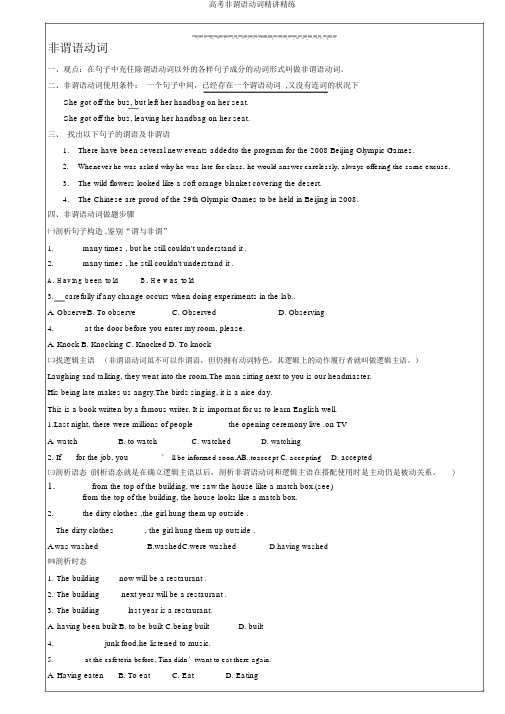
非谓语动词一、观点:在句子中充任除谓语动词以外的各样句子成分的动词形式叫做非谓语动词。
二、非谓语动词使用条件:一个句子中间,已经存在一个谓语动词 ,又没有连词的状况下She got off the bus, but left her handbag on her seat.She got off the bus, leaving her handbag on her seat.三、找出以下句子的谓语及非谓语1.There have been several new events addedto the program for the 2008 Beijing Olympic Games.2.Whenever he was asked why he was late for class, he would answer carelessly, always offering the same excuse.3.The wild flowers looked like a soft orange blanket covering the desert.4.The Chinese are proud of the 29th Olympic Games to be held in Beijing in 2008.四、非谓语动词做题步骤㈠剖析句子构造 ,鉴别“谓与非谓”1.______many times , but he still couldn't understand it .2.______many times , he still couldn't understand it .A. Having been toldB. He was told3.__ carefully if any change occurs when doing experiments in the lab..A. ObserveB. To observeC. ObservedD. Observing4. ______ at the door before you enter my room, please.A. KnockB. KnockingC. KnockedD. To knock㈡找逻辑主语(非谓语动词虽不可以作谓语,但仍拥有动词特色,其逻辑上的动作履行者就叫做逻辑主语。
非谓语动词精讲精炼
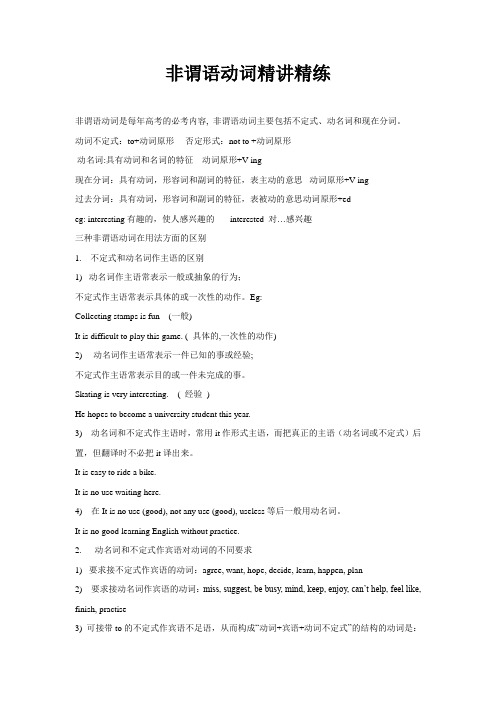
非谓语动词精讲精练非谓语动词是每年高考的必考内容, 非谓语动词主要包括不定式、动名词和现在分词。
动词不定式:to+动词原形否定形式:not to +动词原形动名词:具有动词和名词的特征动词原形+V-ing现在分词:具有动词,形容词和副词的特征,表主动的意思动词原形+V-ing过去分词:具有动词,形容词和副词的特征,表被动的意思动词原形+edeg: interesting有趣的,使人感兴趣的interested 对…感兴趣三种非谓语动词在用法方面的区别1. 不定式和动名词作主语的区别1) 动名词作主语常表示一般或抽象的行为;不定式作主语常表示具体的或一次性的动作。
Eg:Collecting stamps is fun (一般)It is difficult to play this game. ( 具体的,一次性的动作)2) 动名词作主语常表示一件已知的事或经验;不定式作主语常表示目的或一件未完成的事。
Skating is very interesting. ( 经验)He hopes to become a university student this year.3) 动名词和不定式作主语时,常用it作形式主语,而把真正的主语(动名词或不定式)后置,但翻译时不必把it译出来。
It is easy to ride a bike.It is no use waiting here.4) 在It is no use (good), not any use (good), useless等后一般用动名词。
It is no good learning English without practice.2. 动名词和不定式作宾语对动词的不同要求1) 要求接不定式作宾语的动词:agree, want, hope, decide, learn, happen, plan2) 要求接动名词作宾语的动词:miss, suggest, be busy, mind, keep, enjoy, can’t help, feel like, finish, practise3) 可接带to的不定式作宾语不足语,从而构成“动词+宾语+动词不定式”的结构的动词是:ask, tell, invite, order, want, beg, advise, encourage4) 可接不带to的不定式作宾语不足语的动词是:make, let, have5) 有些动词用动名词和不定式作宾语有差别A)forget to do 忘记要去做某事(此事未做)forget doing忘记做过某事(此事已做过或已发生)B)stop to do 停止、中断(某件事),目的是去做另一件事stop doing 停止正在或经常做的事C)remember to do 记住去做某事(未做)remember doing记得做过某事(已做)D) regret to do对要做的事遗憾regret doing对做过的事遗憾、后悔E)try to do努力、企图做某事try doing试验、试一试某种办法F) mean to do打算,有意要…mean doing意味着G)go on to do 继而(去做另外一件事情)go on doing 继续(原先没有做完的事情)H)propose to do 打算(要做某事)proposing doing建议(做某事)非谓语动词典型试题1. He had wonderful childhood, _____ (travel) with his mother to all corners of the word2. Lots of rescue workers were working around the clock, ________(send) supplies to Yushu, Oinghai province after the earthquake.3. __________ (look) at my classmates' faces, I read the same excitement in their eyes.4. I'm calling to enquire about the position _________ (advertise) in yesterday's China Daily.5. Listen! Do you hear someone _______ (call) for help?6. Dina, ________ (struggle) for months to find a job as a waitress, finally took a position at a local advertising agency.7. So far nobody has claimed the money ________ (discover) in the library.8. The retired man donated most of his savings to the school damaged by the earthquake inYushu ,________ (enable) the students to return to their classrooms.9. The lady welled around the shops, __________ (keep) an eye out for bargains.10. Alexander tried to get his work _______ (recognize) in the medical circles.11. The next thing he saw was smoke from behind the house.A. roseB. risingC. to riseD. risen12. Sit down, Emma. You will only make yourself more tired, on you feet.A. to keepB. keepingC. having keptD. to have kept13. Passengers are permitted only one piece of hand luggage onto the plane.A. to carryB. carryingC. to be carriedD. being carried14. ______ into English, the sentence was found to have an entirely different word order.A. TranslatingB. TranslatedC. To translateD. Having translated15. Mike found his missing car in the street outside his house, ______ newly cleaned and polished.A. lookedB. to lookC. lookingD. to be looking16. ______ in 1955, Disneyland in California is regarded by many as the original fun park.A. OpenedB. Having openedC. OpeningD. Being opened17. Look over there—there’s a very long, winding path _________ up to the house.A. leadingB. leadsC. ledD. to lead18. The difference in thickness and weight from the earlier version makes the iPad 2 more comfortable .A. heldB. holdingC. be heldD. to hold19. Tom asked the candy makers if they could make the chocolate easier _____ into small pieces.A. breakB. breakingC. brokenD. to break20. Ladex doesn’t feel like abroad. Her parents are old.A. studyB. studyingC. studiedD. to study21. Simon made a big bamboo box the little sick bird till it could fly.A. keepB. keptC. keepingD. to keep22. an important role in a new movie, Andy has a chance to become famous.A. OfferB. OfferingC. OfferedD. To offer23. More TV programs, according to government officials, will be produced people’sconcern over food safety.A. to raiseB. raisingC. to have raisedD. having raised24. Michael put up a picture of Yao Ming beside the bed to keep himself ________ of his own dreams.A. remindingB. to remindC. remindedD. remind25. Claire had her luggage an hour before her plane left.A. checkB. checkingC. to checkD. checked26. More highways have been built in China,___________it much easier for people to travel form one place to another.A. makingB. madeC. to makeD. having made27. The ability _____ an idea is as important as the idea itselfA. expressingB. expressedC. to expressD. to be expressed28. The players ______from the whole country are expected to bring us honor in this summer game.A. selectingB. to selectC. selectedD. having selected29. Do you wake up every morning __________ energetic and ready to start a new day?A. feelB. to feelC. feelingD. felt30. around the fire, the tourists danced with the local people.A. GatherB. To gatherC. GatheringD. To be gathering非谓语动词参考答案:1. traveling;2.sending;3.Looking;4. advertised;5.calling;6. having struggled;7.discovered;8.enabling 9. keeping; 10. recognized;11-15 BBABC 16-20 AADAB 21-25 DCACD 26-30 ACCCC。
高考英语语法精讲精练-非谓语动词

高考英语二轮语法词汇复习系列第九章非谓语动词动词除了在句子中充当谓语外,还具有名词、形容词及副词的性质动词的非谓语形式,可在句中作主语、表语、宾语、定语、补语和状语等,称作非谓语动词,包括动词不定式、分词和动名词。
高考重点要求:1、掌握不定式、分词、动名词在句子中的作用2、区分不定式、分词作定语和状语的异同3、掌握不定式、动名词作宾语,不定式和分词作宾补的惯用结构4、注意非谓语动词与句子谓语动词的时间关系,以确定非谓语动词的时态形式5、弄清非谓语动词与其逻辑主语的关系,以确定非谓语动词的语态形式第一节知识点概述一、动词不定式动词不定式的基本形式是“to+动词原形”,有时可以不带to。
动词不定式没有人称和数的变化,在句子中不能作谓语,但可以担任主语、表语、宾语、状语和宾语补足语。
动词不定式仍保留动词的一些特点。
(一)动词不定式的特征及用法1.动词不定式的构成及特征“to +动词原形”构成动词不定式,是一种非谓语形式,在句子中不能作谓语,没有人称和数的变化,它具有名词、形容词和副词的特征。
2.动词不定式的用法动词不定式具有名词、形容词和副词的特征,在句子中可以作主语、表语、宾语、定语和状语。
1.作主语例如:To learn English well is not easy.或It is not easy to learn English well.动词不定式作主语时,往往用it作形式主语,这种句型可归纳为下面的句型:It is + adj.+ 动词不定式如果要说明不定式的动作执行者,可以用forIt is + adj.+ for sb. to do sth.2.作表语My wish is to become a teacher.3.作宾语Most of us like to watch football matches.4.作宾语补足语He told me to be here on time.5.作定语I have nothing to say about that thing.6.作状语He stopped to have a look.3.动词不定式的否定形式动词不定式的否定形式not + to + 动词原形例如:He asked me not to make such a mistake.4.动词不定式与疑问词连用疑问代词who, what, which和疑问副词when, where, how, why等后面可以接动词不定式,构成动词不定式短语,可以在句子中作主语、宾语、表语等成分。
(完整word版)(免费版)非谓语动词精讲及专项练习

2013届高三英语语法要点精讲(配最新高考+模拟)专题06 非谓语动词【考纲解读】非谓语动词是历年来的考查重点之一,因为它们结构复杂,功能繁多,也是考生难于掌握的语法点, 2012年的高考题中考查共有33题之多。
考查重点主要有不定式的完成式、被动式、进行式、否定结构及省略形式;不定式和分词作后置定语的区别;只能接动名词的动词和接动名词、不定式有区别的动词的用法;动名词的被动用法及分词作为定语、状语、宾补的用法。
尤其是作状语的用法,在非谓语动词的考题中占的比例最大;其次是非谓语动词作补语和宾语的用法,也占一定的比例.不管怎么考,基本上离不开非谓语动词的基本用法,只是题干的设置注重了句子结构的复杂化和语境化。
所以做非谓语动词题不仅要理清句子的结构,还要理解句子的意思。
毋庸置疑,来年高考中,非谓语动词定是一个考查热点.【知识要点】定义:在英语中,不作句子谓语,而具有除谓语外其他语法功能的动词,叫做非谓语动词。
分类:非谓语动词有动词不定式(the Infinitive);动名词(the Gerund);现在分词(the Present Participle);过去分词(the Past Participle)一、动词不定式不定式由“to+动词原形”构成,其否定形式是“not to+动词原形"。
不定式可以带宾语或状语构成不定式短语,没有人称和数的变化,但有时态和语态的变化.不定式可作主语、宾语、状语、表语和定语,但不能单独作谓语。
1。
不定式的时态及语态时态主动被动意义例句语态一般todotobedone与谓语动词同时发生或以后发生I’m glad to seeyou.当不定式逻辑上的主语是这个不定式所表示的动作的承受者时,不定式须用被动形式。
如:He asked to besent to work inTibet.This book is进行tobedoing表示谓语的动作(情况)发生时,不定式表示的动作正在进行He pretended to bereading a book when Icame in。
高考英语(第九讲 非谓语动词)语法精讲精练 教师版

非谓语动词是高考的重点和热点,也是我们英语学习中所碰到的难点之一。
非谓语动词分为三种形式:不定式,V-ing分词(又分为现在分词和动名词)和过去分词。
1.非谓语动词的语法功能注:常见作独立成分的非谓语动词to tell you the truth(实话说),needless to say(不用说),to be honest/frank(老实说,坦白说),to be more exact(更确切地说),to make things worse (更糟的是),not to mention…(更不用说),Generally / Frankly / Roughly speaking (一般说来 / 坦白说 / 粗略地说)2.非谓语动词的变化形式(一)辨别谓语与非谓语特别注意分析句子的结构才能辨别谓语与非谓语。
①The traffic rule says young children under the age of four and __ less than40 pounds must be in a child safety seat.A. being weighedB. weighsC. weighedD. weighing【解析】容易误选B或C,将其当成谓语看待。
under the age of four and ____ less than 40 pounds用作children的定语。
动词weigh与名词children是主动关系,所以选择weighing。
②______ blood if you can and many lives will be saved.A. GivingB. GiveC. GivenD. To give【解析】如果不注意分析句子结构,会误选A或C项。
这是祈使句+and+陈述句的句型。
答案B。
(二)非谓语作主语、宾语的重点1.it充当动词不定式的形式主语或形式宾语①It is important for us to learn English very well.对我们来说学好英语是非常重要的。
- 1、下载文档前请自行甄别文档内容的完整性,平台不提供额外的编辑、内容补充、找答案等附加服务。
- 2、"仅部分预览"的文档,不可在线预览部分如存在完整性等问题,可反馈申请退款(可完整预览的文档不适用该条件!)。
- 3、如文档侵犯您的权益,请联系客服反馈,我们会尽快为您处理(人工客服工作时间:9:00-18:30)。
九、非谓语动词动词的非谓语用法一直是高考中的热点,在此需要研究的是热点中的热点。
对近年高考中的非谓语现象经过认真的分析归纳,我发现有下列规律和热点。
主 动 被 动 其 它将来 to do to be done 一次动作(全过程)进行 doing being done 经常、习惯;过去事实 完成 having done having been done 在……以后(状语)完成 done 被 …… (状语)三不:主、宾不用 done ;表、补、定不用 having (been) done ;状语不用 being done 。
六要:主宾 疑问词+动词 要用不定式。
表语 appear/seem/happen/be said 后要用to do/to be doing/to have done/to be done 。
补语 感官、使役动词后补语不定式要省to ,变被动还原to ; 表被动 要用done 。
定语 the+序数词+名词+表主动的动词 要用不定式to do 或to have done 。
状语 目的和意外结果 要用不定式。
形容词+状语(to do ) 原因 用to do 或to be done; 方式 用to do 主动表被动。
一、非谓语动词词组起副词作用,作状语。
【热点1】主语一致动词词组用作状语时,逻辑主语必须和主句主语一致,否则多使用从句作状语。
1.Faced with a bill for $ 10,000, _______.(陕西06)A. John has taken an extra jobB. the boss has given john an extra jobC. an extra job has been takenD. an extra job has been given to John2. While watching television, _______.(全国II05)A. the doorbell rangB. the doorbell ringsC. we heard the doorbell ringD. we heard the doorbell rings【热点2】目的,意外结果。
作状语时,不定式只可用于这两种用法,其它则排除。
3. _______ this cake, you'll need 2 eggs, 175 g sugar and 175 g flour.(广东06)A. Having madeB. MakeC. To makeD. Making4. When asked why he went there, he said he was sent there _______ for a space flight.A. trainingB. being trainedC. to have trainedD. to be trained (江西07)5. All these gifts must be mailed immediately _______ in time for Christmas. (辽宁05)A. to have receivedB. to receiveC. to be receivedD. to be receiving6. ______ more about university courses, call (920) 746-3789. (浙江05)A. To find outB. Finding outC. Find outD. Having found out7. He hurried to the booking office only _______ that all the tickets had been sold out.A. to tellB. to be toldC. tellingD. told (陕西06)8. He hurried to the station only _______ that the train had left. (广东05)A. to have foundB. findingC. foundD. to find【热点3】(形容词+)to do :原因(to do ,to be done ),方式(仅to do )9. I feel greatly honored ____ into their society.(北京08)A. to welcomeB. welcomingC. to be welcomedD. welcomed10. You were silly not ____ your car.(湖南04)A. to lockB. to have lockedC. lockingD. having locked11. I like getting up very early in summer. The morning air is so good .(全国I08)A. to be breathedB. to breatheC. breathingD. being breathed【热点4】作状语,表时间、原因、自然结果、伴随和补充等,关键判断主动与被动。
12. Don't sit there ______ nothing. Come and help me with this table. (湖北06)A. doB. to doC. doingD. and doing13. _____ and happy, Tony stood up and accepted the prize. (全国06)A. SurprisingB. SurprisedC. Being surprisedD. To be surprising14. He was busy writing a story, only ______ once in a while to smoke a cigarette. (辽宁08)A. to stopB. stoppingC. to have sloppedD. having stopped15. ______ that he was in great danger, Eric walked deeper into the forest. (浙江08)A. Not realizedB. Not to realizeC. Not realizingD. Not to have realized16. We all know that, _____, the situation will get worse. (全国07)A. not if dealt carefully withB. if not carefully dealt withC. if dealt not carefully withD. not if carefully dealt with17. The research is so designed that once _____ nothing can be done to change it.(全国02)A. beginsB. having begunC. beginningD. begun18. When _____ help, one o ften says “Thank you.” or “It’s kind of you.”(福建05)A. offeringB. to offerC. to be offeredD. Offered19. When _____ different cultures, we often pay attention only to the differences without noticing the many similarities. (浙江06)A. comparedB. being comparedC. comparingD. having compared20. _____ with the size of the whole earth, the biggest ocean does not seem big at all.A. CompareB. When comparingC. ComparingD. When compared(湖北04)21. Lucy’s new job was paid twice as much as she had made ____ in the restaurant.A. workingB. workC. to workD. worked(山东08)22. Peter received a letter just now _____ his grandma would come to see him soon.A. saidB. saysC. sayingD. to say(四川07)23. _______ for the breakdown of tile school computer network, Alice was in low spirits.A. BlamingB. BlamedC. To blameD. To be blamed(福建06)【热点5】having done表示完成、主动,即非谓语动作发生在主句谓语动作之前,译作:在…以后。
having been done表示完成、被动。
24. The old man, _____ abroad for twenty years, is on the way back to his motherland.A. to workB. workingC. to have workedD. having worked(江苏04)25. The manager, _____ it clear to us that he didn’t agree with us, left the meeting room.A. who has madeB. having madeC. madeD. making(江西05)26. _____ around the Water Cube, we were then taken to see the Bird’s Nest for the 2008 Olympic Games. (陕西08)A. Having shownB. To be shownC. Having been shownD. To show27. _____ the program, they have to stay there for another two weeks. (广东04)A. Not completingB. Not completedC. Not having completedD. Having not completed【热点6】形意一致。
